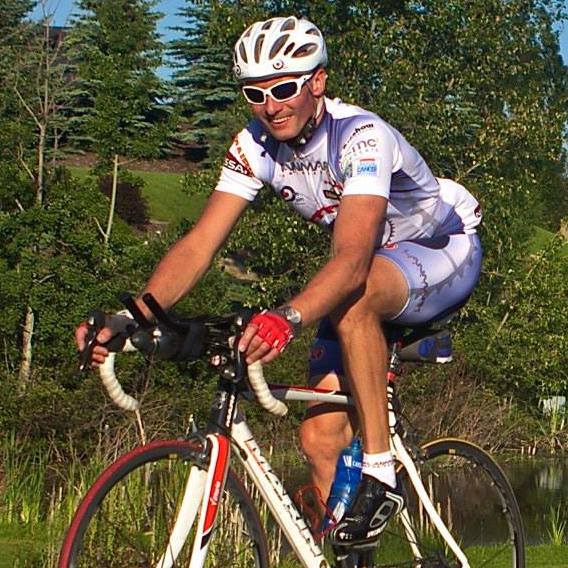Ten years ago, the first edition of Alberta’s Enbridge Ride to Conquer Cancer was held in the foothills south of Calgary. This weekend, I will be doing The Ride for the tenth time. Since it started, The Ride has raised over $66 million for cancer research, cancer prevention, and enhanced cancer care. A decade of riding and fundraising compels me to ask myself, “What has it accomplished? What has changed?” Well, the answer to those questions is that The Ride, and the proceeds raised by it and other events like it, have facilitated unprecedented progress and had a massive impact on the lives of those facing cancer.

When President Nixon announced the “War on Cancer” in 1971, we knew almost nothing about the biology of cancer, and the tools to effectively examine that biology did not exist. At that time, slightly fewer than 50% of cancer patients survived more than five years. Now, ~70% survive more than five years. Although a 20% increase may seem like modest progress over an almost 50-year time span, it has changed the face of cancer. That 20% improvement translates into more than 120,000 Americans being alive every year because of the progress that has been made.
Ask any of those survivors what they owe their lives to, and they will most likely say their doctors and/or research. However without research, we will do the same things tomorrow that we are doing today. And despite the progress noted above, that is still not good enough. Entire areas of research simply did not exist 15-20 years ago. For example, until 2003, it was not known that the Human Papilloma Virus caused approximately half of all throat cancers. Prior to 2000, people thought stomach cancer was caused by stress. We now know it is caused by a strain of bacteria. These cancers can be prevented by a vaccine and antibiotics, respectively. The powerful effect of physical activity in reducing people’s risk of cancer and improving their survival has only been appreciated within the past 15 years. We have entered the era of biologic and immunotherapies designed to target only the cancer cells by using antibodies, vaccines, inhibitors, and re-educated immune cells. If our original approach was to “carpet bomb” the patient, we now have the ability to use biologic smart-bombs and our own immune system to seek and destroy.
The cumulative progress in treatment means that many cancers that were invariably fatal are now curable in more than than 90% of patients. Lymphoma, childhood leukemia, and testicular cancer are all highly curable. In fact, even metastatic (cancer that has spread) cancer can be cured in some patients for many types of cancer.
So, why do we ride? We ride, because although there is still a long way to go, we can see how far we have come. Yes, we are disappointed progress is not faster, but we also know, “It may be a slow process, but quitting doesn’t make it faster.” We cannot expect things to change if we do not make them change.
So, if the progress has been modest (~20% improved survival) but simultaneously transformational, over the past 47 years, how can we be so optimistic we can continue to make progress and eventually conquer cancer? Our optimism is based on the fact that tools available to facilitate progress are advancing at an astonishing rate. Our progress in the past was made with vastly inferior tools. For example, the Human Genome Project (to “spell out” or sequence the entire human DNA) was completed in 2003. It was a global undertaking, took 10 years, and cost $2.7 billion. That same work can now be completed in a single laboratory, in an afternoon, and for approximately $1,000! The availability of these newer tools is transforming how we approach cancer both in research and in the clinic. For example, tumors are increasingly being defined by their biology rather than merely the anatomic site where they were found.
If this progress somehow seems abstract and distant, The Ride brings it sharply into focus. Funds raised by The Ride , in Alberta alone, have enabled over 6,000 patients in Alberta to benefit from the most cutting edge treatments via clinical trials.
The yellow flags that adorn so many bikes signify that the rider is a cancer survivor They are the embodiment of our progress so far. You don’t have to look too far to match up progress with patients, whether it’s early detection, more effective treatment, or even just the social support they receive, because people feel more comfortable sharing their journey with others. Even within our team, we have riders who would most likely not be around today if they had been diagnosed 15-20 years ago.
So, why do we ride? We ride, because although there is still a long way to go, we can see how far we have come. Yes, we are disappointed progress is not faster, but we also know, “It may be a slow process, but quitting doesn’t make it faster.” We cannot expect things to change if we do not make them change.
We know we can change the future, because we have already changed the past. It’s a powerful feeling; every one of us can make a difference by helping fuel progress cancer prevention and research by riding, volunteering or making a donation.






Future for humanitarian reason a cancer free society . Which is attainable when we work together.